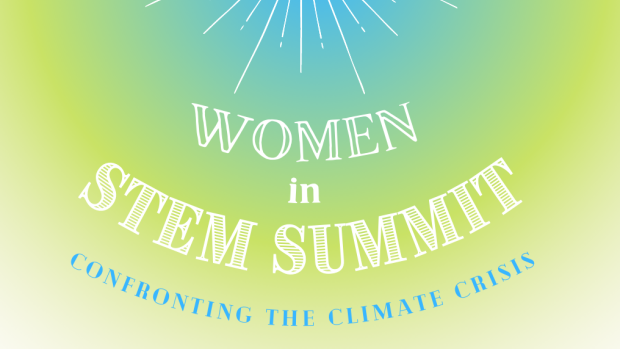The 11th annual Women in STEM Summit addressed the intersection between gender diversity and climate change

NYU Tandon’s 11th annual Women in STEM Summit — presented in a hybrid format involving virtual and in-person events — kicked off in early March with a thought-provoking keynote by Research Assistant Professor Theodora Dryer, Lead Research Scholar for Climate + Water at the AI Now Institute, a fitting choice for a multiday event that had “Confronting Climate Change” as its timely theme.
Among Dryer’s main areas of study is water justice: the right of people to control local resources and the ways in which those resources can be distributed equitably — a particular source of concern for indigenous peoples such as members of the Navajo Nation and Hopi Tribe living in Rio Grande pueblos along the Colorado River. She spoke to a rapt audience at Tandon’s MakerSpace, encouraging attendees to ignore the dominant narrative, which often ignores how colonial expansion, social inequities, and technological development and deployment have exacerbated our planet’s woes. Consider the topic from a wider angle that encompasses those issues, she suggested, as well as from a more personal perspective: what kind of environment will allow you to truly thrive, she asked.
In addition to the keynote, attendees were invited to attend a “Green Zone” training that covered key concepts and terminology related to sustainability, facilitated dialogue about environmental justice, and suggested actions that could be taken to address climate change on both an individual and institutional level. The week continued with a curated tour of the Brooklyn Museum that focused on the special exhibit “Climate in Crisis: Environmental Change in the Indigenous Americas” and culminated with a virtual panel discussion with young alumni who are forging successful careers in the sustainability space.
They included:
Angel Chen (Sustainable Urban Environments)
Chen, now a Sustainability Consultant at Kinetic Communities Consulting, advised, “Identify what sustainability means to you. Do you want to work directly with climate issues, reducing energy usage, or policy change? There are so many ways to apply sustainability to whatever you're studying now, so you’ll find a pathway if you plan for it.
Anmol Sajjad (Chemical Engineering)
A Senior Project Engineer at Brightcore Energy, Sajjad says, “I feel a connection to urban environments because I was born and raised in Brooklyn, but I was told that it would be hard to find a job involving solar or renewable energy near the city. So as graduation neared, I managed my expectations. I ended up accepting a lower-level job at an energy start-up that turned out to be a great foot in the door on the way to where I am now. Keep in mind that in the construction industry, specifically, a lot of solar project engineers are chemical or mechanical by background; you're not necessarily required to be an electrical engineer.”
Neo Monese (Chemical and Biomolecular Engineering)
Monese worked at Columbia University’s Earth Institute and NASA before accepting her current post as a Climate Scientist in Global Sustainable Finance (Technology) at Morgan Stanley. She advises: If there are scientists and professors whose work you admire, find their email addresses and reach out directly to them. Tell them you want to get your hands dirty with some actual experience. They’ve all been there where you are now, and you might be surprised at how many will answer you. The job portals can be a black hole, and this is a more personal way to make a connection.
Iffat Jahan (Sustainable Urban Environments)
Jahan, an Analyst at NYC DCAS Energy Management, began her career as a community development fellow, facilitating and promoting the integration of green and sustainable practices at a nonprofit that worked in low-and moderate-income neighborhoods. “That’s how I began learning about financing, tracking energy and utility data, incentive programs, and project management, and all that took me to where I am today.”
“When approaching this year's Women in STEM Summit, our planning team kept coming back to the themes of environmental justice and sustainability found in this year's NYU Reads selection, Braiding Sweetgrass,” said Randi Amalfitano, an Executive Assistant and Special Projects Coordinator in NYU Tandon’s Office of Student Life & Services. “We saw an opportunity to meld the two programs and use this year's Summit to explore how gender diversity also intersected with climate change and how engineers are working to combat it. We're pleased with the diverse lineup of programs we were able to bring together to shed light on these important issues and look forward to continuing the conversation beyond the Summit.”




